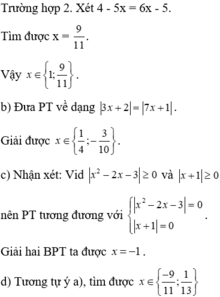
Hãy nhập câu hỏi của bạn vào đây, nếu là tài khoản VIP, bạn sẽ được ưu tiên trả lời.


Bài 1)1)\(x^2+5x+6=x^2+3x+2x+6\)=0
=x(x+3)+2(x+3)=(x+2)(x+3)=0
Dễ rồi
2)\(x^2-x-6=0=x^2-3x+2x-6=0\)
=x(x-3)+2(x-3)=0
=(x+2)(x-3)=0
Dễ rồi
3)Phương trình tương đương:\(\left(x^2+1\right)\left(x+2\right)^2=0\)
Vì \(x^2+1>0\)
=>\(\left(x+2\right)^2=0\)
Dễ rồi
4)Phương trình tương đương\(x^2\left(x+1\right)+\left(x+1\right)\)=0
=> \(\left(x^2+1\right)\left(x+1\right)=0Vì\) \(x^2+1>0\)
=>x+1=0
=>..................
5)\(x^2-7x+6=x^2-6x-x+6\) =0
=x(x-6)-(x-6)=0
=(x-1)(x-6)=0
=>.....
6)\(2x^2-3x-5=2x^2+2x-5x-5\)=0
=2x(x+1)-5(x+1)=0
=(2x-5)(x+1)=0
7)\(x^2-3x+4x-12\)=x(x-3)+4(x-3)=(x+4)(x-3)=0
Dễ rồi
Nghỉ đã hôm sau làm mệt

ý bạn là như thế này đúng không ạ:
a/ \(x^2-6x+5=0\)
\(x^2-5x-x+5=0\)
\(x\left(x-5\right)-\left(x-5\right)=0\)
\(\left(x-5\right)\left(x-1\right)=0\)
\(\orbr{\begin{cases}x-5=0\rightarrow x=5\\x-1=0\rightarrow x=1\end{cases}}\)
b/\(2x^2+7x+9=0\)
?!
c/ \(4x^2-7x+3=0\)
\(4x^2-4x-3x+3=0\)
\(4x\left(x-1\right)-3\left(x-1\right)=0\)
\(\left(x-1\right)\left(4x-3\right)=0\)
\(\orbr{\begin{cases}x-1=0\Rightarrow x=1\\4x-3=0\Rightarrow x=\frac{3}{4}\end{cases}}\)
d/ \(2\left(x+5\right)=2x+10\)
-,- mik ko rõ đề ạ, sai thì ibox ạ.Cảm ơn

Bài 1:
a) (3x - 2)(4x + 5) = 0
<=> 3x - 2 = 0 hoặc 4x + 5 = 0
<=> 3x = 2 hoặc 4x = -5
<=> x = 2/3 hoặc x = -5/4
b) (2,3x - 6,9)(0,1x + 2) = 0
<=> 2,3x - 6,9 = 0 hoặc 0,1x + 2 = 0
<=> 2,3x = 6,9 hoặc 0,1x = -2
<=> x = 3 hoặc x = -20
c) (4x + 2)(x^2 + 1) = 0
<=> 4x + 2 = 0 hoặc x^2 + 1 # 0
<=> 4x = -2
<=> x = -2/4 = -1/2
d) (2x + 7)(x - 5)(5x + 1) = 0
<=> 2x + 7 = 0 hoặc x - 5 = 0 hoặc 5x + 1 = 0
<=> 2x = -7 hoặc x = 5 hoặc 5x = -1
<=> x = -7/2 hoặc x = 5 hoặc x = -1/5

a: (3x-2)(4x+5)=0
=>3x-2=0 hoặc 4x+5=0
=>x=2/3 hoặc x=-5/4
b: (2,3x-6,9)(0,1x+2)=0
=>2,3x-6,9=0 hoặc 0,1x+2=0
=>x=3 hoặc x=-20
c: =>(x-3)(2x+5)=0
=>x-3=0 hoặc 2x+5=0
=>x=3 hoặc x=-5/2

3x2 + 2x - 1 = 0
=> 3x2 + 3x - x - 1 = 0
=> 3x(x + 1) - (x + 1) = 0
=> (3x - 1)(x + 1) = 0
=> \(\orbr{\begin{cases}3x-1=0\\x+1=0\end{cases}}\)
=> \(\orbr{\begin{cases}x=\frac{1}{3}\\x=-1\end{cases}}\)
x2 - 5x + 6 = 0
=> x2 - 2x - 3x + 6 = 0
=> x(x - 2) - 3(x - 2) = 0
=> (x - 3)(x - 2) = 0
=> \(\orbr{\begin{cases}x-3=0\\x-2=0\end{cases}}\)
=> \(\orbr{\begin{cases}x=3\\x=2\end{cases}}\)
3x2 + 7x + 2 = 0
=> 3x2 + 6x + x + 2 = 0
=> 3x(x + 2) + (x + 2) = 0
=> (3x + 1)(x + 2) = 0
=> \(\orbr{\begin{cases}3x+1=0\\x+2=0\end{cases}}\)
=> \(\orbr{\begin{cases}x=-\frac{1}{3}\\x=-2\end{cases}}\)
1, \(3x^2+2x-1=0\Leftrightarrow3x^2+3x-x-1=0\)
\(\Leftrightarrow3x\left(x+1\right)-\left(x+1\right)=0\)
\(\Leftrightarrow\left(x+1\right)\left(3x-1\right)=0\)
\(\Leftrightarrow\orbr{\begin{cases}x+1=0\\3x-1=0\end{cases}\Leftrightarrow\orbr{\begin{cases}x=-1\\x=\frac{1}{3}\end{cases}}}\)
2, \(x^2-5x+6=0\Leftrightarrow x^2-2x-3x+6=0\)
\(\Leftrightarrow x\left(x-2\right)-3\left(x-2\right)=0\)
\(\Leftrightarrow\left(x-2\right)\left(x-3\right)=0\)
\(\Leftrightarrow\orbr{\begin{cases}x-2=0\\x-3=0\end{cases}\Leftrightarrow\orbr{\begin{cases}x=2\\x=3\end{cases}}}\)
3, \(3x^2+7x+2=0\Leftrightarrow3x^2+6x+x+2=0\)
\(\Leftrightarrow3x\left(x+2\right)+\left(x+2\right)=0\)
\(\Leftrightarrow\left(x+2\right)\left(3x+1\right)=0\)
\(\Leftrightarrow\orbr{\begin{cases}x+2=0\\3x+1=0\end{cases}\Leftrightarrow\orbr{\begin{cases}x=-2\\x=-\frac{1}{3}\end{cases}}}\)

A, => (x-2)(x+2)(x-3)(x-3)=0
\(\Leftrightarrow\left[\begin{matrix}x-2=0\\x+2=0\\x-3=0\\x-3=0\end{matrix}\right.\Leftrightarrow\left[\begin{matrix}x=2\\x=-2\\x=3\\x=-3\end{matrix}\right.\)
Vậy tập no của pt ..
B, \(\Leftrightarrow x^2+2x+5x+10=0\)
\(\Leftrightarrow x\left(x+2\right)+5\left(x+2\right)=0\)
\(\Leftrightarrow\left(x+2\right)\left(x+5\right)=0\)
\(\Leftrightarrow\left[\begin{matrix}x+2=0\\x+5=0\end{matrix}\right.\Leftrightarrow\left[\begin{matrix}x=-2\\x=-5\end{matrix}\right.\)
Vậy ...............
C, \(\Leftrightarrow3x^2-6x-6x+12=0\)
\(\Leftrightarrow3x\left(x-2\right)-6\left(x-2\right)=0\)
\(\Leftrightarrow\left(x-2\right)\left(3x-6\right)=0\)
\(\Leftrightarrow\left[\begin{matrix}x-2=0\\3x-6=0\end{matrix}\right.\Leftrightarrow\left[\begin{matrix}x=2\\x=2\end{matrix}\right.\)
Vậy tập no của pt là S{2}





a. Ta có:
\(x^2-6x+3=0\Leftrightarrow x^2-2.x.3+3^2-6=0\)
\(\Leftrightarrow\left(x-3\right)^2-6=0\)
\(\Leftrightarrow\left[{}\begin{matrix}x-3=\sqrt{6}\\x-3=-\sqrt{6}\end{matrix}\right.\)
\(\Leftrightarrow\left[{}\begin{matrix}x=3+\sqrt{6}\\x=3-\sqrt{6}\end{matrix}\right.\)
Ta có:
\(x^2-7x+14=0\)
\(\Leftrightarrow x^2-2.x.\dfrac{7}{2}+\dfrac{49}{4}+\dfrac{7}{4}=0\)
\(\Leftrightarrow\left(x+\dfrac{7}{2}\right)^2+\dfrac{7}{4}=0\)
Ta có: \(\left(x+\dfrac{7}{2}\right)^2\ge0\)
=> \(\left(x+\dfrac{7}{2}\right)^2+\dfrac{7}{4}>0\)
=> pt vô nghiệm